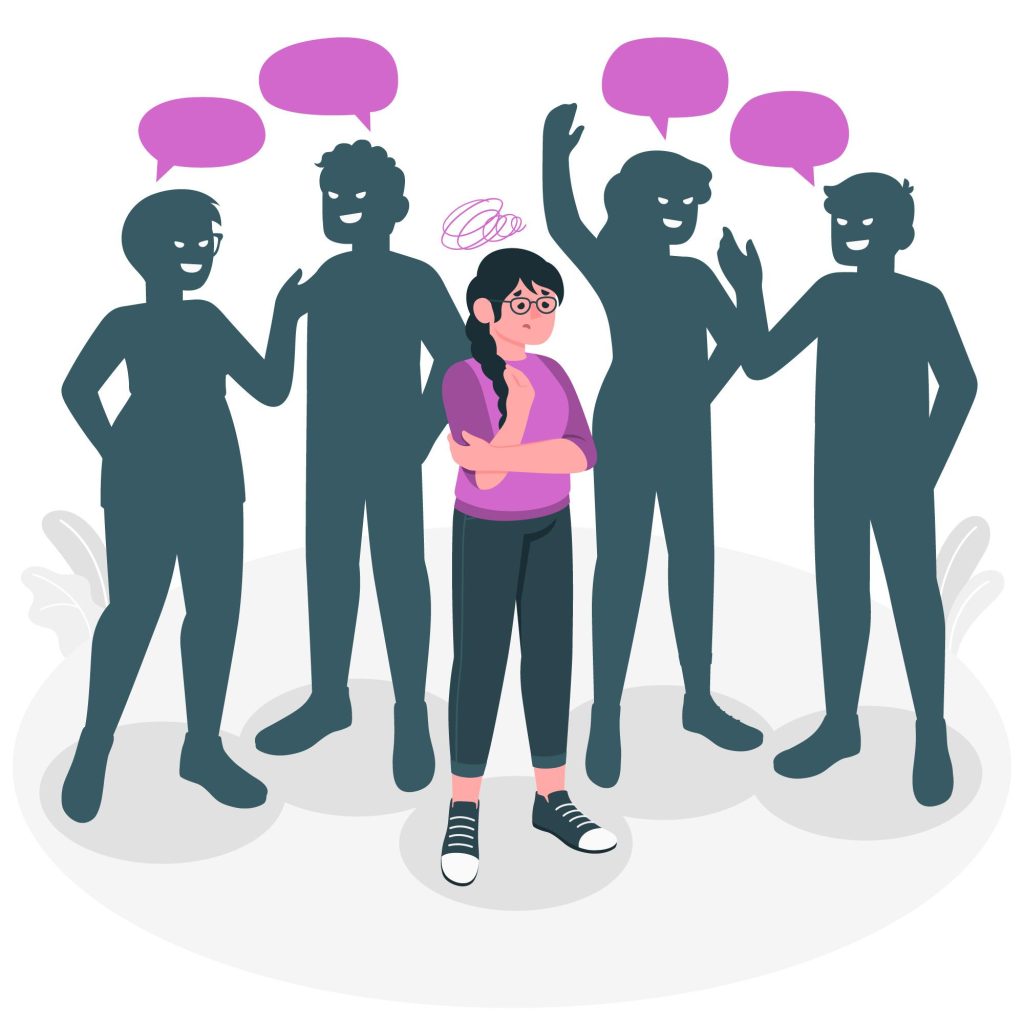
Therapy for Social Anxiety
Social Anxiety can be an extremely challenging experience that can affect multiple areas of your life. However, you can overcome social anxiety, one step at a time.
We are here for you.
35000
Sessions
22+
YEARS EXPERIENCE
500000+
LIVES IMPACTED
What Is Social Anxiety?
Social Anxiety can be described as the intense fear during social interactions or situations. People with social anxiety constantly worry about being judged by others, or doing something embarrassing publicly. This leads to the fear and avoidance of social situations.
It is quite normal to experience a slight flutter in your stomach, or nervousness before giving an exam, or interview. However, when you feel a persistent, intense fear while you are having regular social interactions, it may be an indication of social anxiety.
The symptoms of social anxiety start to interfere with your daily life, and can negatively impact your personal, school, and work life. Like other anxiety disorders like OCD and Panic attacks, an excessive amount of time can go into managing and worrying about your symptoms coming back.
Social anxiety is a manageable disorder if you seek help at the right time. Psychotherapy, self-help measures, and often medications can help you feel relieved from your fear of social interactions.
Reasons Why We Develop Social Anxiety
Some of the reasons behind developing Social Anxiety are:

Childhood Experiences
Your early experiences and environmental factors, such as having highly-critical or judgmental parents can cause you to internalize their judgments, making you self-critical and anxious about how you are perceived by others.
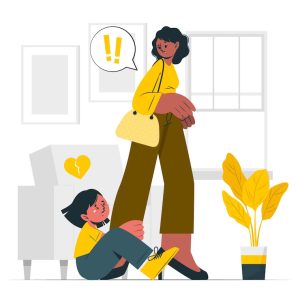
Genetic Factors
Having a close relative or family member with social anxiety, or any anxiety disorder can also put you at risk of developing social anxiety disorder.
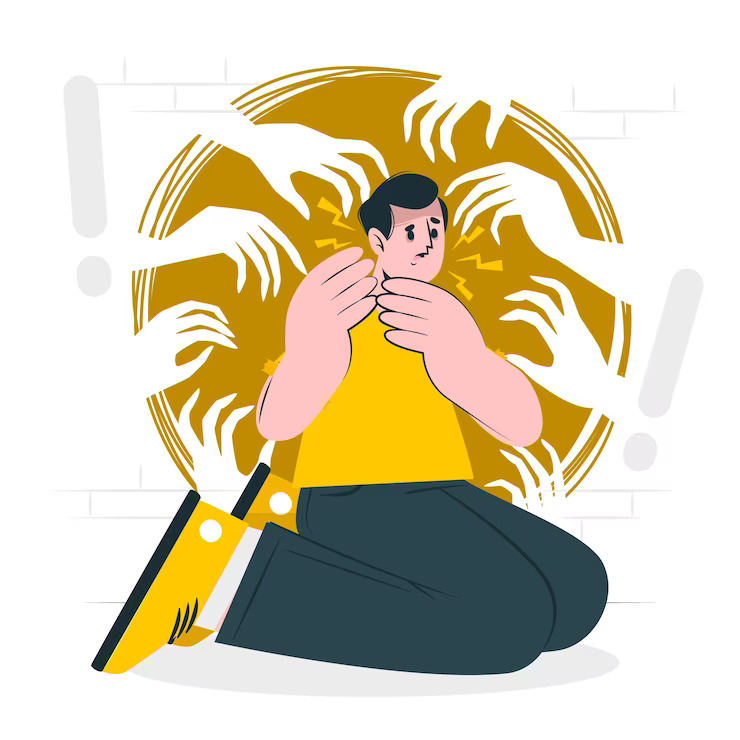
Bullying & Rejection
Facing rejection and ill-treatment from peers can also negatively impact your self-esteem and self-perception. These incidents can cause you to view social interaction as dangerous, unsafe or negative, leading to social anxiety.

Perfectionism
Perfectionism is often characterized by black-or-white thinking, extreme fear of making mistakes, self-criticism, and increased focus on how you are perceived by others. Perfection can co-occur with social anxiety due to their similarities. Having a highly rigid approach to yourself can often cause negative self- evaluation, which leads to social anxiety.

Having other Anxiety Disorders
Since anxiety disorders have a common symptom of anxiety, having one anxiety disorder like a panic disorder, can put you at a greater risk of having another anxiety disorder.

Distraction from other anxieties
The underlying factor in all the anxiety disorders, including social anxiety, is anxiety. Social anxiety can be a way to distract you from other anxieties in your life. Focusing on our social anxiety can shift your focus away from complicated, painful emotions or anxieties in the mind that you can’t process in the moment.
How Social Anxiety Manifests in Everyday Life: Symptoms Of Social Anxiety
People often confuse social anxiety with being introverted, shy, and reserved. However, they are not the same.
While shyness and social anxiety may seem similar, shyness is a normal personality trait whereas social anxiety is an anxiety disorder. But, if there is extreme shyness coupled with intense anxiety about social interactions, it could be an indication of social anxiety.
Social anxiety can impact how you feel inside. It can cause feelings of extreme discomfort and anxiety when you are in the presence of other people. It also affects how you perceive and interact with other people, and the quality of your social relationships.
Social phobia manifests in the following ways:
- Avoiding social situations like public gatherings or parties.
- Feeling afraid of interacting with or talking to new people or strangers.
- Feeling embarrassed of being in the presence of others.
- Worrying constantly whether you, your actions, or what you are saying is being watched and judged by others.
- Fear of public speaking.
- Worrying excessively of how you are perceived by the public.
- Being highly self-critical.
- Having difficulty establishing and maintaining friendships and romantic relationships.
Social anxiety, like other anxiety disorders, also has physical symptoms, such as shaking, sweating, stammering, avoiding eye contact, having a racing heartbeat, shallow breathing, and panic attacks in extreme situations.
How Does Online Counseling For Social Anxiety Work?
Online counseling is conducted over the clients’ preferred online medium, such as video conferencing services, or phone call. Irrespective of the medium, therapists ensure your safety and privacy while you use these services.
Flexibility in timings
Easy access to more therapists and services
Ensured safety, confidentiality, and quality of services
How To Manage Social Anxiety
Like all other anxiety disorders, treating social anxiety involves two stages. First, it involves managing your symptoms. This includes the negative thoughts, feelings, and physical sensations you experience when you are in a public setting or anticipate being in one.
Second, to manage social anxiety, you have to go into the deeper and more complex beliefs, and emotions that lie beneath our fear of social interactions.
Managing your fear of social situations can be highly distressing. However, with the right support, therapy, self-help strategies, and lifestyle changes, you can successfully manage your social anxiety and lead a happy and peaceful life.

Contact Us For Online Counseling for Social Anxiety
Online Counseling can be a great opportunity for you to work towards creating a supportive, healthy, and positive social interactions.
We are here for you.
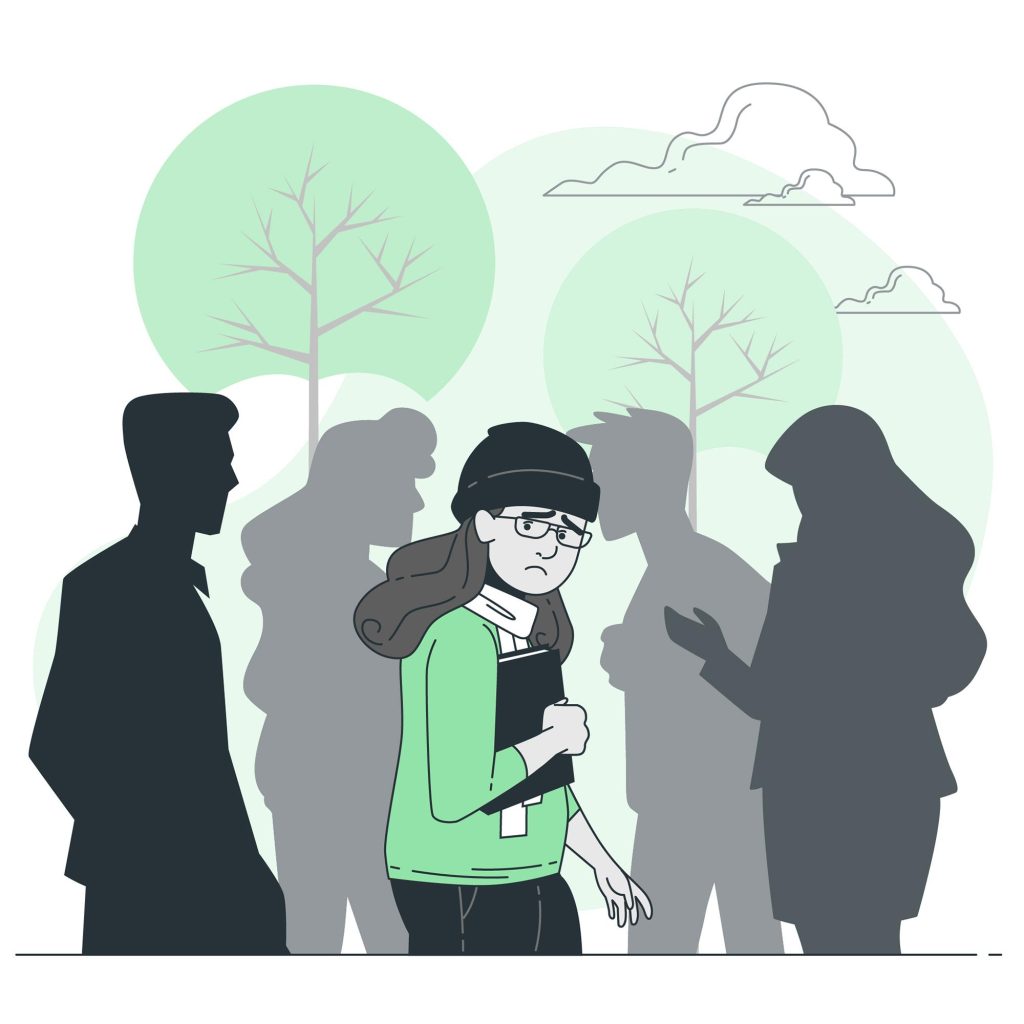
Benefits Of Therapy for Social Anxiety
Counseling or Therapy can help you navigate through your anxiety in social situations. Therapists can help you in understanding more about the symptoms, causes, and ways to manage social anxiety. They help you process your fear of social interactions, as well as the deep, unprocessed emotions, in a safe environment.
Therapy also addresses the negative, and unhelpful thought patterns you have when you anticipate or are in social situations. Therapists can suggest strategies and coping skills to manage these thought patterns and create newer and balanced ways of thinking.
Social anxiety can bring about a wide range of emotions such as fear, shame, and embarrassment. It is also coupled with sensations in the body such as numbness, heaviness in the body, as well as aches and discomfort. Therapy can make you feel more regulated and relaxed in your body, which helps you hold space for unpleasant sensations and emotions.
How Mindfulness Can Help You Manage Social Anxiety
Mindfulness is the act of being aware and present, without judging it. In social anxiety, you may constantly be preoccupied with worrying about how you are perceived in social situations, You may also be concerned about saying the wrong things or behaving awkwardly in social settings. These thoughts can put you in a state of overwhelm and anxiety. Mindfulness teaches you to slow down your body and racing thoughts. It also helps you become intentionally present with yourself and become aware of your bodily sensations when you are experiencing anxiety.
Since mindfulness as a practice is about being aware of and accepting things as they are, it can help you accept yourself for who you are. It can help you establish a witness mindset, so that you are able to watch your anxiety, instead of being caught up in it.
A great way to incorporate mindfulness into your practice is “Body Scan.” Body scan helps you witness and observe sensations within the body and sit with them, while focusing on regulating our nervous system through our breath.
You can check out this guided, short body scan video to help you get started with this practice.
How Online Counseling & Therapy Work
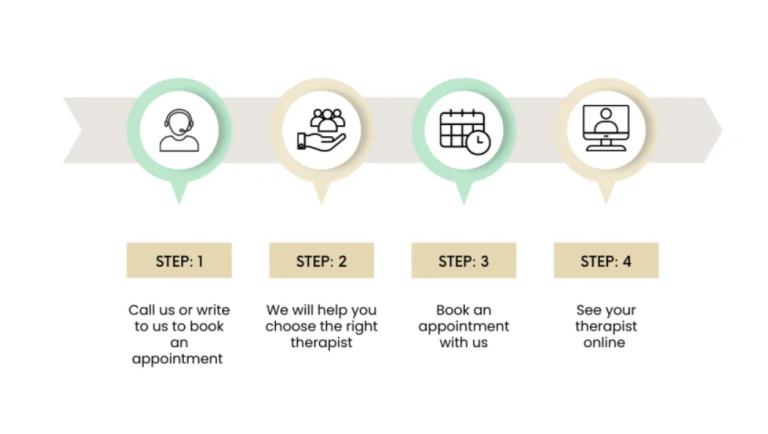
Self-Help Techniques: How You Can Support Yourself

Apart from seeking professional support, there are also ways to support yourself through social anxiety.
- Recognizing your triggers: Knowing is half the battle. Learning more about social anxiety and your triggers can help you become better prepared for social interactions. This preparedness can also help you feel less overwhelmed and anxious.
- Letting go of avoidance behaviours: One of the major features of social anxiety is the fear of social interactions. This fear can be so overwhelming that you may avoid any circumstances that can trigger your social anxiety. Noticing what you avoid, and consciously exposing ourselves to what you fear can help you understand what lies on the other side of your fears. Facing what you avoid can eventually reduce the fears you associate with social interactions.
- Allowing Vulnerability: Embracing vulnerability involves observing, understanding, and accepting our fears and uncomfortable emotions. While this is a long-term process that requires patience, it helps you to learn your deeper patterns and triggers that lead to social anxiety. Being vulnerable also involves accepting the reality of the present and reducing the tendency to control and deny it.
- Developing a healthy, non-judgmental relationship with yourself: This is often the most difficult habit to cultivate when you have a negative self-perception. Developing an accepting, compassionate mindset towards yourself, that accepts all the positives and the flaws can help you feel more confident and secure in your social interactions.
- We have also added a few free resources below that you can use to manage your anxiety and sit with uncomfortable emotions.
Guided meditation to help you feel less vulnerable
Dealing with Trauma and Emotional Overwhelm Playlist
- Medications: You may need medication if the social anxiety symptoms are severe and are interfering with day-to-day functioning. Please ensure that you meet a psychiatrist or a mental health professional in order to start medications. It is not recommended to take anti-anxiety medication on your own.
Social anxiety is now exceedingly common among many individuals, especially the younger adults. Being constantly overwhelmed by social interactions can take a toll on the mind and the body. However, seeking help and support soon can help you cope with your anxiety better. With the right tools, guidance, and treatments, you can also lead a happy, healthy, and peaceful life.
Meet Our Therapists & Counselors And Book An Appointment
Our therapists are all trained psychologists qualified in helping people work through their difficulties. We work with individuals across different populations. We use an eclectic range of psychotherapies from solution oriented to insight oriented to holistic meditative approaches, depending on the need and comfort of the clients.
"What Our Clients Say about Our Online Counseling Services"





Ready to live a life free of Social Anxiety?
Discover the benefits of counseling and therapy by booking a session with us through the links below. We are here for you.
FAQs for Online Counseling and Therapy
Therapy does involve talking about your issues. But, therapists also assess your concerns to help you work on them. It is a collaborative process that involves understanding your thoughts, feelings, and emotions, and setting goals to build healthy coping mechanisms to handl
All our therapists are qualified psychologists with a post graduate degree in clinical or counseling psychology. We do not hire people with diplomas or short-term training courses. They are all personally interviewed and hired by our founder Sadia Saeed who is a trained clinical psychologist and has been practicing for over 23 years. She not only ensures their qualification but also verifies their therapeutic approach. We believe it is very important that our therapists come from a supportive and exploratory therapeutic approach rather than an advisory one.
Most therapists conduct their sessions once a week for the duration of one hour. Therefore, the timings for sessions can be scheduled as per you and the therapist’s convenience. While therapy can seem time-consuming, it is a great investment towards your mental health and quality of life.
Therapy, like other strategies, is a great tool to manage your anxiety. While therapy can’t completely get rid of the anxiety, it can help you be better prepared for. Therapy helps you understand your symptoms better, and learn coping strategies to manage social anxiety. This can help in reducing the intensity of your anxiety symptoms.





